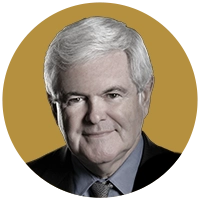Trump’s Mideast Tour Underscores Global Power Shift Away From America’s Old European Allies
A map of the world based on traditional military power shows a dramatic, indeed radical, shift from the world even a few decades ago.

President Trump’s amazing Middle East tour last week underscores how much the world has changed — and how hard it is for some to adjust to that change.
We all have memories and ideas from the past which limit our ability to understand the present and anticipate the future.
Dubai is now a city of 3.8 million. It is home to the Burj Khalifa, which houses the world’s tallest hotel and an amazing restaurant on the 122nd floor. Dubai’s illuminated skyline is a reminder that the center of wealth has shifted a long way from the world of 1970.
During his four-day trip, Mr. Trump picked up $1 trillion in orders for American goods and $1 trillion in investment commitments. He started both his terms in office by going to Riyadh, Saudi Arabia — not London, Paris, or Berlin — for his first official foreign trips.
The world has clearly changed.
Consider the change in military power. Those of us who are old enough remember the terrible power of the German army of the 1940s. It fought simultaneously in North Africa and Russia. Today, Germany has a mere 329 tanks. Communist China has 6,800 tanks. France has 437 tanks, while India has 4,200. Great Britain has 227 tanks. Egypt has 3,620. A map of the world based on traditional military power would show a dramatic, indeed radical, shift from the world even a few decades ago.
Europe has crippled its future through a reliance on regulation rather than innovation. It has adopted welfare state costs it can’t possibly afford. And it has developed labor laws which make it nearly impossible to fire bad workers. Businesses there avoid hiring because workers potentially represent lifetime costs.
As a result, there are no trillion-dollar corporations in Europe. America has seven trillion-dollar capitalized companies, and Saudi Arabia has one.
Further, Europe has enormous disadvantages to developing new technology.
Powerful artificial intelligence requires massive amounts of electricity. Europe’s green, anti-development culture has crippled its ability to generate power.
New technologies are developed by risk-taking entrepreneurial personalities. They seek venture capital and gamble on future prosperity. The European system is protective of old money. Its rules and patterns make it difficult to create new money.
Dramatic technological changes also always involve a certain amount of turmoil. There are many losers and a few winners (consider the automotive companies between 1890 and 1930 or the personal computing winners and losers in the 1990s). The European system favors stability over progress. It prefers bureaucratic, old-money corporate alliances over open, tumultuous entrepreneurial breakthroughs.
As artificial intelligence and new innovations become more important, Europe will fall further behind.
The world is also different in terms of sheer population. Nigeria is now home to more people than all of Western Europe combined. India has replaced China as the largest country in population — and the gap is widening. As the old order ages and loses human capital, the new order will emerge from a variety of previously overlooked places.
The world is changing in almost every aspect of life, politics, power, science, and technology.
Our survival and success require us to have the courage to learn about the emerging world — and the discipline to recognize when our ideas and patterns are obsolete or out-of-date.
America’s ability to adapt to the new reality is the biggest challenge we face in remaining the strongest, safest, most prosperous nation on Earth.

